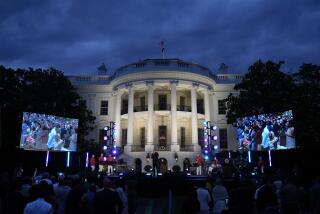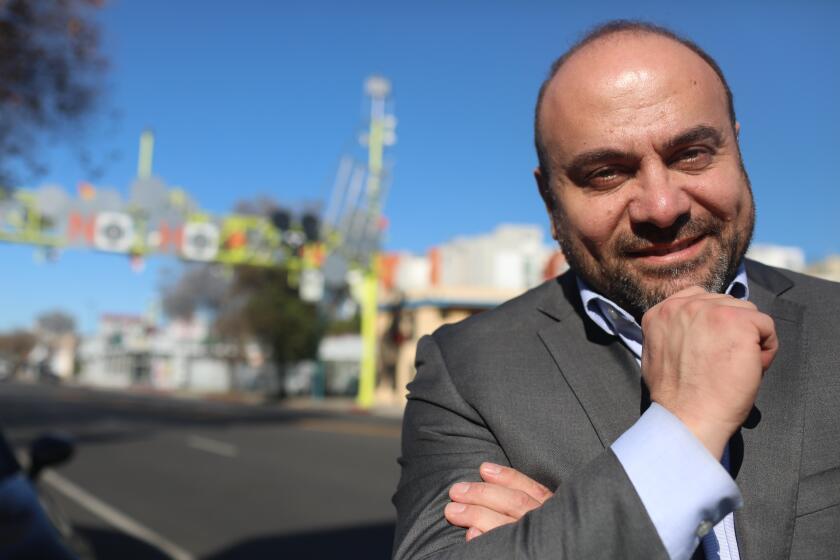Editorial: Can a holiday to honor Native Americans help heal a history of oppression?
The Los Angeles City Council is considering joining a movement to replace Columbus Day with an official holiday called Indigenous Peoples Day, to recognize the contributions, as well as the suffering, of the nation’s original inhabitants.
Of course, giving city workers a day off would not begin to make amends for centuries of discrimination, enslavement and government-sanctioned genocide of Native Americans. Nor would wiping Columbus Day off the calendar reverse the destruction of indigenous peoples’ sacred spaces or the attacks on their cultural heritage.
Without question, Los Angeles, along with California and the nation as a whole, must do a far better job recognizing the violent history of oppression that decimated the country’s indigenous people. California’s political leaders in the 1850s made no secret of their desire to exterminate the area’s native inhabitants. State legislators funded anti-Indian militias. Native people were massacred. Villages were destroyed and tribes forcibly relocated. Yet few Californians know the details of this terrible history.
Is it not possible to honor the spirit and ambition of exploration while also acknowledging the terrible damage inflicted by the colonial powers?
Would a holiday help Californians learn about this shameful period and encourage the process of reconciliation? Possibly. But only if the symbolic holiday is paired with meaningful policies and honest statements. California’s leaders could consider, for instance, an official public apology for the state’s history of mistreating native peoples. Or they could debate whether to compensate tribes that lost sacred sites or return land that holds special value. The city could, if it chose, provide greater protection for sacred sites threatened by building projects or it could offer its official support for local tribes, many of which are still seeking federal recognition. The true stories of native peoples, beyond the simplistic portrayal of the first Thanksgiving meal, must become part of our national narrative. Schools should be required to teach the history, warts and all. Los Angeles has the nation’s second-largest population of Native Americans.
But the effort to raise public consciousness about the history of native peoples has become a zero-sum game. Proponents say it’s not enough to designate an Indigenous Peoples Day. The government also has to remove Columbus Day from the official calendar because, in these observers’ view, it honors a cruel slave trader whose arrival in the “New World” set into motion the mass killing of native peoples. Columbus represents the violent colonization of the Americas, they say, so in this war of symbolism Columbus Day must die so Indigenous Peoples Day can live.
But why must this be a binary choice? The debate over Columbus and his legacy reflects ongoing confusion in the United States about how the country’s history of racism and oppression fits into a proud national identity. The U.S. is a nation that has taken in millions of needy immigrants — but also grew through a colonization process that devastated native people. It’s a country that was founded by individuals fleeing oppression — but who then prospered on the labor of slaves. Even Columbus Day itself sends a bit of a mixed message: It wasn’t created to celebrate colonial domination at all, but was designated as a federal holiday in the 1934 after a campaign by Italian Americans and Catholics, who were then targets of ethnic and religious discrimination, to help establish their place in U.S. history.
Erasing history is not the answer. The better approach is to confront it straight on, honestly and comprehensively.
Whether the holiday is called Columbus Day or Indigenous Peoples Day or Explorers Day or History Day, is it not possible to honor the spirit and ambition of exploration while also acknowledging the terrible damage inflicted by the colonial powers? Isn’t there a way to celebrate the rise of a democratic nation built on a promise of liberty and equality, while also recognizing that progress for some led to displacement, injustice and death for others? There should be.
Follow the Opinion section on Twitter @latimesopinion and Facebook
More to Read
A cure for the common opinion
Get thought-provoking perspectives with our weekly newsletter.
You may occasionally receive promotional content from the Los Angeles Times.










